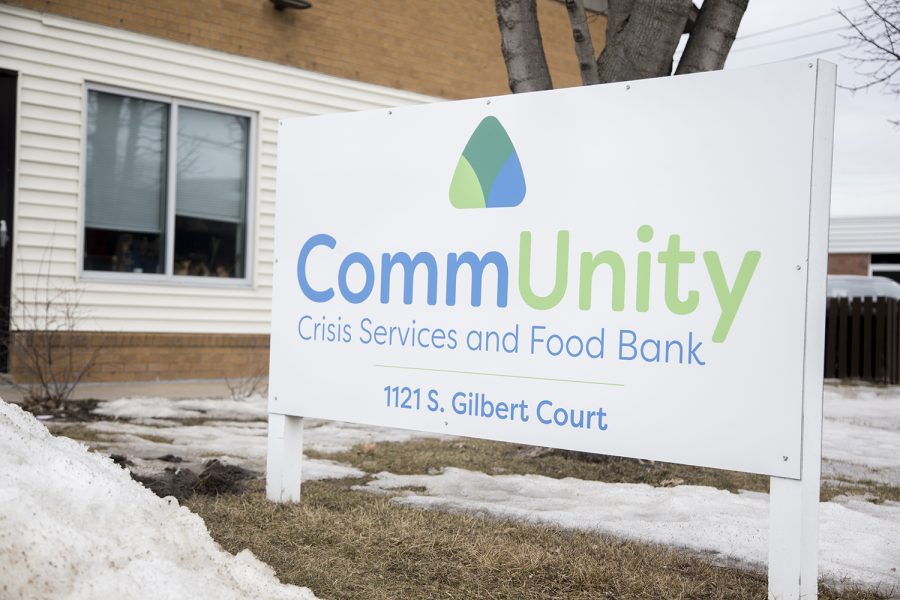Opinion | CommUnity Crisis Services and Iowa City Police Department relationship is a step in the right direction
The hiring of a police-liaison by CommUnity Crisis is a promising step toward mental-health focused policing.
The CommUnity Crisis Services and Food Bank is seen on Tuesday, March 12, 2019. Formerly known as the Crisis Center of Johnson County, the food bank rebranded in order to emphasize the importance of community.
February 16, 2021
After a summer of protesting police violence, it is gratifying that concrete changes are being made in our community — even if those changes are not as far reaching as they should be.
Recently, The Daily Iowan reported that CommUnity Crisis Services will hire a law enforcement liaison to ensure the safety of mental health professionals during calls. This newly created position develops an essential relationship between Iowa City Police and mental health resources.
Police brutality is rampant in America. Statistics compiled by The Prison Policy Initiative shows that 33.5 people were killed by American law enforcement per every 10 million people. Comparing this to Canada (9.8), Germany (1.3), and Japan (0.2), it is clear that American cops are exceedingly more likely to utilize deadly force.
An often overlooked component of these statistics is law enforcement’s abysmal handling of mental health cases. Since 2015, 1,397 Americans with a mental illness have been fatally shot by police officers; that amounts to 23 percent of all fatal shootings by law enforcement.
Last September, a 13-year-old boy with autism was shot by police in Salt Lake City, Utah. His mother had called hoping to arrange medical treatment for what she described as a mental breakdown. Despite being unarmed while running away, the teenager ended up with a gunshot wound.
The data proves both quantitatively and qualitatively that police officers are ill-equipped to deal with mental health issues. This is unacceptable given the frequency with which their jobs place them in mental crisis situations. A police force that cannot effectively manage mental health situations is comparable to a fire station that can’t put out grease fires.
For these reasons, I am excited to see a cooperative effort between the Iowa City Police and CommUnity that will address these disparities.
Imagine if that 13-year-old was met with a mental health professional instead of just a police officer. Or, at the very least, if the responding officer had accompanied mental health professionals in similar past situations. Nothing is certain, but it seems likely that the outcome would have been drastically different.
A police liaison position benefits both officers and mental health professionals. Officers will learn new skills for aiding mental health crises, and counselors will feel more secure while doing their work.
People in crisis may react violently to responders, and in these scenarios the presence of an officer can provide a sense of security that is currently lacking. However, it is important to maintain the counselor as the primary respondent. The accompanying officer should only intervene if a situation becomes dangerous.
Cedar Rapids recently began a similar partnership that has already yielded improvement. Foundation 2 Crisis Services C.O.O Sarah Nelson called it a great success, according to the Cedar Rapids Gazette, because having a team member with mental health expertise allows law enforcement to effectively deal with a broader range of scenarios.
This plan does not go far enough in addressing the need for mental health focused policing in our community, and it certainly will not solve overnight the racially biased policing that plagues the country. But when positive change occurs, it must be celebrated because more change is encouraged
This plan should be praised as a stepping stone toward a more just method of policing, not as a final destination.
Columns reflect the opinions of the authors and are not necessarily those of the Editorial Board, The Daily Iowan, or other organizations in which the author may be involved.




